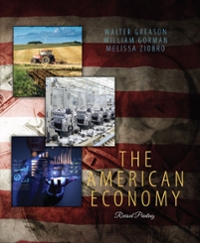Question
The state of North Carolina has, as do many other states, a law against so-called price gouging. Price gouging is defined to be an excessively
The state of North Carolina has, as do many other states, a law against so-called "price gouging." Price gouging is defined to be an excessively high price. The law can be fairly complicated, but here is the exact wording of North Carolina General Statute 75-38:
"Upon a triggering event, it is prohibited and shall be a violation of G.S. 751.1 for any person to sell or rent or offer to sell or rent any goods or services which are consumed or used as a direct result of an emergency or which are consumed or used to preserve, protect, or sustain life, health, safety, or economic wellbeing of persons or their property with the knowledge and intent to charge a price that is unreasonably excessive under the circumstances. In determining whether a price is unreasonably excessive, it shall be considered whether:
(1)The price charged by the seller is attributable to additional costs imposed by the seller's supplier or other costs of providing the good or service during the triggering event.
(2)The price charged by the seller exceeds the seller's average price in the preceding 60 days before the triggering event. If the seller did not sell or rent or offer to sell or rent the goods or service in question prior to the time of the triggering event, the price at which the goods or service was generally available in the trade area shall be used as a factor in determining if the seller is charging an unreasonably excessive price.
(3)The price charged by the seller is attributable to fluctuations in applicable commodity markets; fluctuations in applicable regional, national, or international market trends; or to reasonable expenses and charges for the attendant business risk incurred in procuring or selling the goods or services."
Essentially, the law says that it is illegal to charge a price that is "too high" (exact words: "unreasonably excessive") during emergencies or natural disasters. Under the law, the state Attorney General's Office can put a stop to price gouging and seek refunds for consumers who paid too much.The courts may also impose penalties against price gougers of up to $5,000 for each violation. The law applies to all levels of the supply chain from the manufacturer to the distributor to the retailer.
An example of the application of this law was in September 2017, in the wake of a rupture in the pipeline that delivers gas to gas distributors in the state. The price of gas shot up, and many gas stations actually ran out of gas to sell. The North Carolina Attorney General invoked the state's price-gouging law, and asked consumers to report gas stations that we're charging a price that was deemed to be "too high."
a. What is the goal of the price gouging law?
b. What are the effects of the price gouging law? Be specific, using the gas example.
c. Do you think the law is A Good Idea? If you could vote on this law, would you vote to keep it in place or would you vote to get rid of it? Justify your answer.
Step by Step Solution
There are 3 Steps involved in it
Step: 1

Get Instant Access to Expert-Tailored Solutions
See step-by-step solutions with expert insights and AI powered tools for academic success
Step: 2

Step: 3

Ace Your Homework with AI
Get the answers you need in no time with our AI-driven, step-by-step assistance
Get Started


